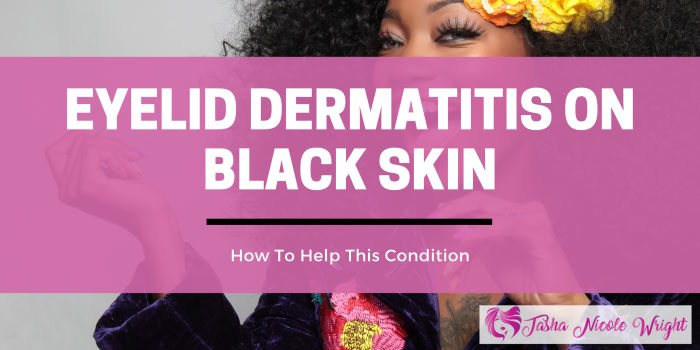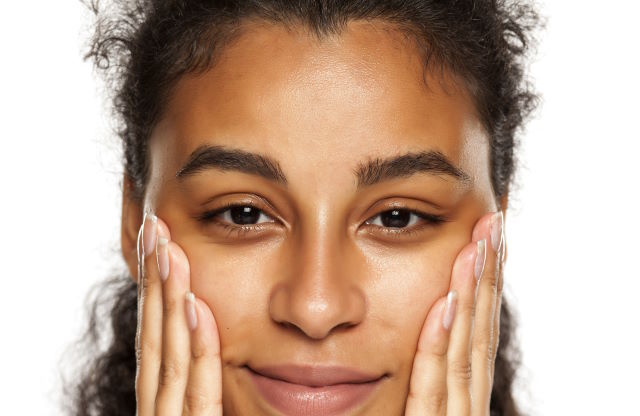
People with black skin can have different responses to skin conditions when compared to individuals with lighter skin tones. They may also be more prone to various skin problems that may be more visible, including eyelid dermatitis.
Eyelid dermatitis on skin of color is a condition that causes redness, itching, flaking, and dryness of the eyelids. It can be quite uncomfortable.
It is a common condition, but its treatment can be challenging as the skin around the eyes is delicate and sensitive. In this article, we will discuss the causes, symptoms, treatment, and prevention of eyelid dermatitis on dark skin.
Symptoms of Eyelid Dermatitis on Skin of Colour
Eyelid dermatitis on black skin can cause the following symptoms:
- Redness and inflammation of the eyelids
- Itchy skin with sometimes a burning sensation
- Flaking and scaly skin of the eyelids
- Dryness and cracking of the skin around the eyes
- Swelling and puffiness of the eyelids
- Dark circles under the eyes

Causes of Eyelid Dermatitis on Black Skin
Eyelid dermatitis on darker skin types can be caused by various factors, including:
Allergies
Allergies to cosmetic products, such as eyeliners, mascaras, and eyeshadows, can cause eyelid dermatitis on black skin.
The ingredients in eye drops can also cause irritation to sensitive skin.
Allergic contact dermatitis can occur when coming into contact with some skincare products, including moisturizers, cleansers, and sunscreens can cause this condition.
Irritants
Irritants, such as soaps, detergents, and rubbing alcohol, can cause eyelid dermatitis in darker skin types. Also, exposure to environmental irritants, such as pollution, dust, and cigarette smoke, can cause this condition.
Family History
Genetic factors can play a big role. So if a family member has eyelid dermatitis to other skin conditions, it’s possible that you can be more susceptible to the condition.

Types of Eyelid Dermatitis
Atopic Dermatitis
Atopic dermatitis, also known as eczema, is a chronic skin condition that causes red, itchy, and scaly patches on the skin. It can affect the eyelids and often causes this condition in black people.
Contact Dermatitis
Contact dermatitis is a type of eczema that occurs when the skin comes in contact with an irritant or allergen.
Seborrheic Dermatitis
Seborrheic dermatitis is a common skin condition that causes red, scaly, and greasy patches on the skin. It often occurs on the scalp but can also affect other areas.
Prevention
Preventing eyelid dermatitis on black skin involves identifying the avoiding triggers and environmental factors that cause the condition.
Here are some of my tips to prevent eyelid dermatitis are:
Patch Testing
Patch testing can be a valuable tool for identifying allergens that can cause eyelid dermatitis. It involves applying a very small amount of a substance to a small patch of skin to see if there is any reaction.
Avoid Triggers
If the cause of eyelid dermatitis on black skin is an allergen or irritant, avoiding the triggers can help in preventing the condition from recurring.
I advise avoiding the use of cosmetics and skincare products that contain irritants or allergens. You should:
- Avoid harsh chemicals and irritants in makeup and skincare products
- Using mild, fragrance-free products on the face and eyelids
- Minimize exposure to environmental irritants such as dust and pollen.
Hypoallergenic Eyewear
If your wear glasses or regularly wear sunglasses, there are solutions on the market to prevent a flare-up from your eyewear.

Keep Your Eyelids Dry
If you often sweat around your eyes or they are moist for other reasons, try to keep them dry as much as possible. A headband can be helpful to keep sweat away from your eye area.
Wash Your Hands Regularly
It’s important to keep your hands clean to prevent dirt or other irritants from coming into contact with your eyes when touching your face. Alternatively, you can wear gloves when dealing with things that irritate you.
Diet
An allergic reaction to some foods can cause a flare-up. You need to identify which foods make redness and itching worse and avoid them.
Treatment of Eyelid Dermatitis on African Skin
The treatment of eyelid dermatitis on African American skin depends on the underlying cause of the condition. The following are some of the treatment options for this condition:
Topical Corticosteroids
Topical corticosteroids are anti-inflammatory medications that can help to reduce inflammation and itching associated with eyelid dermatitis.
However, topical steroids should be used under the supervision of a healthcare professional, as they can cause side effects, such as thinning of the skin.
Moisturizers
Moisturizers can help in keeping the skin around the eyes hydrated and prevent dryness and flaking. I advise using moisturizers that are free from fragrances and other irritants.
Antihistamines
Antihistamines are medications that can help in reducing itching and inflammation associated with allergies. They are available in tablets, capsules, or creams and can be very effective for this condition.
Light Therapy
Light therapy, also known as phototherapy, involves exposing the affected area of the skin to specific wavelengths of light, which can reduce inflammation, kill bacteria, and promote healing.
Light therapy can help improve the skin’s appearance, reduce itching and redness, and promote healing of the affected area.
FAQ
Can eyelid dermatitis on black skin be cured?
While there is no cure for eyelid dermatitis, the condition can be managed with proper treatment and avoiding irritants.
Is eyelid dermatitis contagious?
No, eyelid dermatitis is not contagious and cannot transfer from person to person.
How long does it take for eyelid dermatitis to go away?
The length of time it takes for eyelid dermatitis to go away can vary depending on the severity of the condition and the effectiveness of the treatment. It can take anywhere from a few days to several weeks for symptoms to completely disappear.
Can stress cause eyelid dermatitis?
Stress can worsen certain skin conditions, including eyelid dermatitis. While stress may not directly cause the condition, it can trigger or exacerbate symptoms.
Can you prevent eyelid dermatitis?
While you may not be able to prevent all cases of eyelid dermatitis, you can take steps to reduce your risk. This includes avoiding known irritants and allergens, using mild soaps and moisturizers, and taking steps to manage stress.
Final Thoughts
Eyelid dermatitis can be a frustrating and uncomfortable condition, especially for those with black skin.
However, with proper treatment and management, it is possible to control symptoms and prevent future flare-ups. If you suspect that you may be experiencing this condition, it is essential to speak with a dermatologist for an accurate diagnosis and treatment plan.
Remember to follow a consistent skincare routine, keeps the area clean, avoid harsh products, and take steps to reduce stress in your life. By doing so, you can help to minimize your risk of developing eyelid dermatitis and maintain healthy, glowing skin.

Leave A Comment